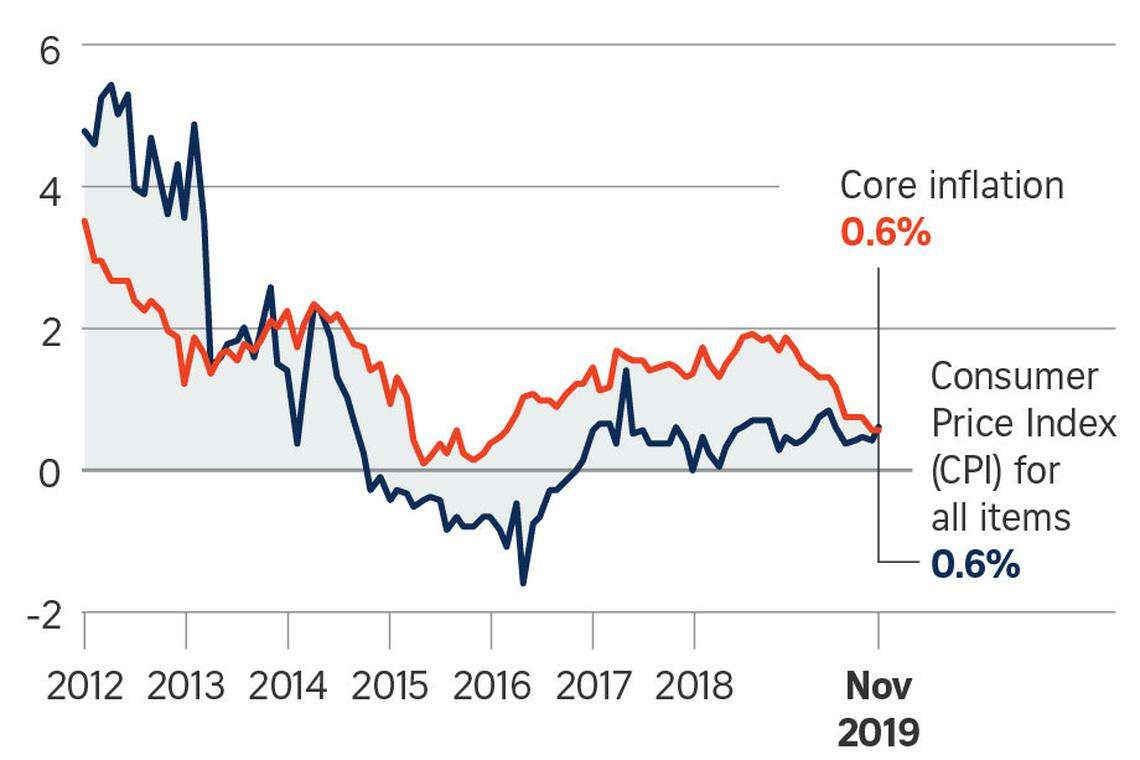Singapore headline inflation inches up while core inflation stays flat in November

SINGAPORE'S headline inflation inched up while core inflation remained flat in November, largely in line with economist expectations.
Headline inflation was at 0.6 per cent year on year in November, according to data released by the Monetary Authority of Singapore (MAS) and the Ministry of Trade and Industry (MTI) on Monday, higher than the 0.4 per cent seen in October and matching economist expectations. The authorities attributed the slight uptick to an increase in private road transport inflation and smaller declines in the costs of retail goods and accommodation, even as services inflation eased.
Core inflation, which excludes accommodation and private road transport costs, was flat at 0.6 per cent in November, lower than the 0.7 per cent estimate by private sector economists. MAS and MTI said lower services inflation was offset by a smaller decline in the cost of retail goods.
Private road transport inflation rose to 2.3 per cent year on year in November, up from 1 per cent in October. This was due to higher petrol prices and Electronic Road Pricing charges, the authorities said.
The cost of retail goods fell by 0.5 per cent year on year in November, easing from the 0.8 drop in October. MAS and MTI said the cost of retail goods saw a more moderate pace of decline as the cost of household durables and clothing and footwear fell to a smaller extent, even though the price of personal care products fell and exerted a downward pressure.
Accommodation costs decreased by 0.2 per cent year on year in November, down from the 0.4 per cent fall in October, as housing rentals declined more gradually.
The cost of electricity and gas declined by 11.8 per cent year on year in November, less than the 12.5 per cent drop in the previous month. This is because the Open Electricity Market had a smaller dampening effect on electricity prices following a slowdown in new take-up rates, MAS and MTI said.
Food inflation was flat at 1.7 per cent year on year in November, as a slower pace of increase in the cost of non-cooked food offset a faster pace of increase in the prices of prepared meals.
Services inflation inched down to 1.1 per cent in November, from 1.2 per cent in October. The authorities said this is largely due to a smaller increase in medical and dental treatment fees, even though telecommunication services fees rose after two consecutive months of decline.
For 2019 full-year core inflation, MAS and MTI expect it to come in at the lower end of the 1 to 2 per cent range, and for 2020, they estimate it to average 0.5 to 1.5 per cent.
The authorities also expect headline inflation to be around 0.5 per cent in 2019, while averaging 0.5 to 1.5 per cent in 2020, as the "negative contribution of imputed rentals to headline inflation dissipates".
"In the quarters ahead, external sources of inflation are likely to remain benign, amid weak demand conditions, and generally well-supplied food and oil commodity markets. However, oil prices could be volatile in the near term, reflecting geopolitical risks.
On the domestic front, labour market conditions are softening slightly. This would lower wage growth in 2019 and 2020, compared to 2018. At the same time, non-labour costs such as retail rents should stay subdued, and any cost pass-through to consumers would be constrained by the weaker economic environment," MAS and MTI said.

KEYWORDS IN THIS ARTICLE
BT is now on Telegram!
For daily updates on weekdays and specially selected content for the weekend. Subscribe to t.me/BizTimes
Economy & Policy
Singapore factory output reverses into negative territory in March, down 9.2%
Tripartism and trust will help Singapore navigate a world ‘fraught with uncertainties’: Tan See Leng
Daily Debrief: What Happened Today (Apr 26)
Singapore must prepare for slower growth at higher costs: MAS
Outgoing Singapore, Indonesia leaders to hold their final retreat in Bogor on Apr 29
Singapore’s growth should strengthen to ‘around potential rate’, output gap to close by end-2024: MAS
